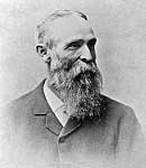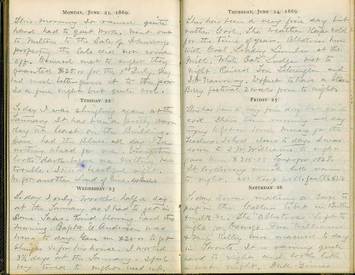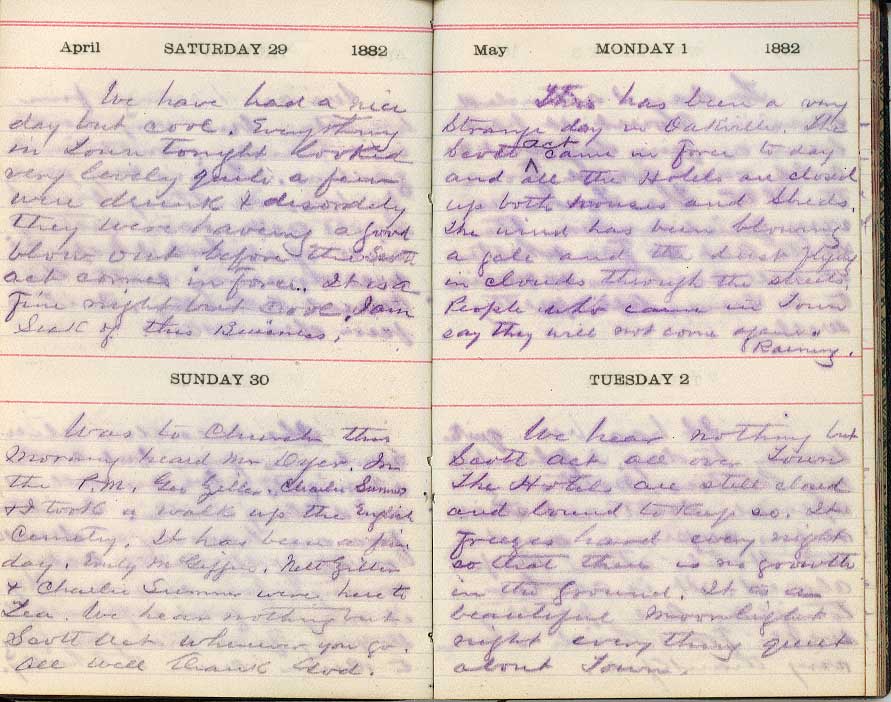The Sumner Diaries

One of the Town's most extraordinary characters in the early years was George Johnson Sumner (1834-1911 - pictured at left in an undated photo), who served as Chief Constable from 1865 to 1902. George Sumner was notable for carrying out and amazing number of civic duties and for the diaries he kept from 1867 to 1909. Because of his kind, quiet manner and meticulous fairness, he was popular in the community and became one of Oakville's most respected citizens.
Here are some excerpts from his diaries:
On Economic Depression

General economic depression combined with failing local commerce caused the population of Oakville to drop from over 2,000 in 1857 to 1,450 by 1861. The largest loss was to the United States. By the end of the century the population still had not regained the level of 1857. Sumner alludes to this a number of times: "Oakville so dull can't even start a fight" - and - "The town is going to the dogs - half the people leaving town for other places."
His mood - likely shared by many local residents - is reflected in this June 22, 1869 entry: "Have had the blues all day. I see nothing ahead for me. Everything looks dark before me. Nothing but trouble."
A few months later (Friday, Oct. 29, 1869) when Oakville House Hotel (north-east corner of Lakeshore and Navy) was enlarged by the addition of a third storey, he wrote:"Johnny Williams is getting his Tavern raised one storey more. Rather a rough time for it."
On the preaching of ministers
Sumner was a Methodist and attended church regularly. In his diary he frequently commented on the preaching of the ministers: "Went to church heard Mr. Moir preach on choosing a wife a silly thing for the pulpit."
On Electricity
Electricity came to Oakville in 1892 with the generating plant located in an old paint factory at the foot of George Street. When the lights went on, Sumner noted: "Electric lights to-night - they show up well."
Continual problems were experienced with the generating system. When generation was discontinued in 1909, power was purchased and the building was converted to a summer cottage / tea house known as the Electric Light Cottage and later, as a private residence, the Worn Doorstep. Demonstrating his understanding of the new-fangled technical aspects, Sumner noted meticulously on the Town street lights: "There are 132 lights of 32 C(andle) P(ower) and 20 of 50 c.p. consuming 5,080 watts per hour. If burning 7 hours per night for the year would cost $3.50 per night. An all night service would cost more."
On his civic duties
When depression came in the 1860s, there were increased numbers of tramps who were provided with food and a place to sleep. Indicative of the hard times was that in 1880 the Town cared for more than 500 tramps. They were reported as being highly pleased with the accommodation at "Hotel de Sumner". Sumner was initially tolerant of troublesome drunks. Only once did he write: "Gave a tramp a caning for giving me impudence."
As tax collector, Sumner drew up and delivered the tax bills, then collected the taxes door to door. Repeated visits throughout the year were required to get in all the tax money. One evening he wrote: "I have been hunting up dogs and taxes. I get plenty of the former but little of the latter. "
On Temperance and Prohibition

While from his writings apparently initially tolerant, it appears that over time George Sumner became a dedicated advocate of temperance, as were many of the townspeople. There was much drunkenness and when the two women proprietors of the Canadian Hotel (SE corner of Navy & Robinson) could not control the many drunken brawls in their establishment, Sumner wrote (Aug. 26, 1881): "The Town is pretty quiet if it were not for the Canadian Hotel they keep up a continual noise most disreptable [sic] for those who profess to be Ladies."
There was much contention as to what controls should be placed on the many taverns. Finally, on Tues., April 19, 1881, Oakville voters took the town dry through the Scott Act, even though neighbouring counties remained wet. On May 1, 1882, Sumner noted: "It has been a very strange day in Oakville. The Scott Act came in force to day [sic] and all the hotels are closed up both houses and sheds....People who came in town say they will not come again."
And several weeks later he commented on the weather: "very dry - I suppose on account of the Scott Act."
On Community Events
The schooner White Oak was launched on Confederation Day, July 1, 1867 amid great celebration. Sumner had worked on the ship's construction, and wrote that night:
"This has been a great day in Oakville. Athletic games etc.
The White Oak was launched at 10 o'clock.
A great many people were present. Everything went off well considering."
A major fire on April 17 - 18, 1883 destroyed most of the buildings on the south side of the main street from Navy Street to just east of Thomas Street.
April 17: "A fire broke out in the Standard Office Brick Block about 11 o'clock P.M. and is burning at a fearful rate."
April 18: "At Twelve. The whole block with Hillmer & Morrisons completely gone at 4 A.M. The whole front Barclays Corner to S.B. Gautry were laid in ashes. It is a sad looking sight. The Town is done for now. Quite a few drunk. Had 8 or 10 men on watching goods [against looting]."
April 19: "Tis a fearful looking wreck and the business part of the Town ruined. "
A spectacular lake storm on April 6, 1886 washed away the 50 year-old pier and lighthouse. Some claimed the waves were 30 feet high. Sumner commented:
“Blowing a gale this A.M. about N.N.E. very unplesant [sic] weather. It increased in force the sea rolling mountains high. Takeing [sic] away the Light House and East Pier and filling the harbor [sic] with gravel. Tonight we have about a foot of Snow the worst storm I ever saw”.
